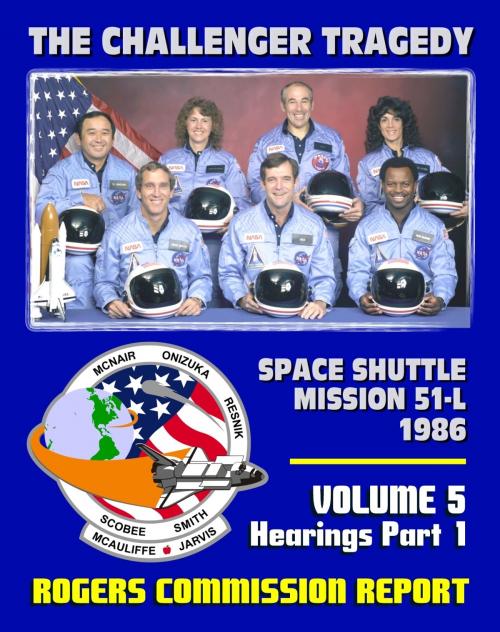The Report of the Presidential Commission on the Space Shuttle Challenger Accident: The Tragedy of Mission 51-L in 1986 - Volume 5 Hearings Part One
Nonfiction, Science & Nature, Science, Physics, Astrophysics & Space Science, History, Americas| Author: | Progressive Management | ISBN: | 9781465719065 |
| Publisher: | Progressive Management | Publication: | February 2, 2012 |
| Imprint: | Smashwords Edition | Language: | English |
| Author: | Progressive Management |
| ISBN: | 9781465719065 |
| Publisher: | Progressive Management |
| Publication: | February 2, 2012 |
| Imprint: | Smashwords Edition |
| Language: | English |
Volume Five of the report issued by the Presidential Commission on the Space Shuttle Challenger Accident (also known as the Rogers Commission after its chairman, William Rogers) contains the transcripts of hearings conducted by the Commission. The report has been professionally converted for accurate flowing-text ebook format reproduction. This reproduction, part one of Volume Five, includes testimony from NASA officials and managers describing the Shuttle program, the Challenger mission, and the circumstances of the accident, plus crucial testimony from Thiokol engineers about the pre-launch controversy over proceeding with the launch in cold temperatures that could affect the performance of Solid Rocket Booster O-rings.
On the twenty-fifth Space Shuttle flight, Challenger exploded 73 seconds after
liftoff on January 28, 1986. The crewmembers of the Challenger represented a cross-section of the American population in terms of race, gender, geography, background, and religion. Christa McAuliffe was to become the first teacher to fly in space. The explosion became one of the most significant events of the 1980s, as billions around the world saw the accident on television and empathized with any one of the several crewmembers killed. The launch took place on an unusually cold day, with temperatures below freezing and ice present on the launch pad and SRBs. NASA and the SRB contractor, Morton Thiokol, debated the safety of the launch; engineers urged managers to delay the launch. President Ronald Reagan formed this Commission to investigate the accident, with the report issued in June 1986.
In view of the findings, the Commission concluded that the cause of the Challenger accident was the failure of the pressure seal in the aft field joint of the right Solid Rocket Motor. The failure was due to a faulty design unacceptably sensitive to a number of factors. These factors were the effects of temperature, physical dimensions, the character of materials, the effects of reusability, processing, and the reaction of the joint to dynamic loading. The Commission concluded that there was a serious flaw in the decision making process leading up to the launch of flight 51-L. A well-structured and managed system emphasizing safety would have flagged the rising doubts about the Solid Rocket Booster joint seal. Had these matters been clearly stated and emphasized in the flight readiness process in terms reflecting the views of most of the Thiokol engineers and at least some of the Marshall engineers, it seems likely that the launch of 51-L might not have occurred when it did. The waiving of launch constraints appears to have been at the expense of flight safety. There was no system which made it imperative that launch constraints and waivers of launch constraints be considered by all levels of management. The Commission concluded that the Thiokol Management reversed its position and recommended the launch of 51-L, at the urging of Marshall and contrary to the views of its engineers in order to accommodate a major customer.
Volume Five of the report issued by the Presidential Commission on the Space Shuttle Challenger Accident (also known as the Rogers Commission after its chairman, William Rogers) contains the transcripts of hearings conducted by the Commission. The report has been professionally converted for accurate flowing-text ebook format reproduction. This reproduction, part one of Volume Five, includes testimony from NASA officials and managers describing the Shuttle program, the Challenger mission, and the circumstances of the accident, plus crucial testimony from Thiokol engineers about the pre-launch controversy over proceeding with the launch in cold temperatures that could affect the performance of Solid Rocket Booster O-rings.
On the twenty-fifth Space Shuttle flight, Challenger exploded 73 seconds after
liftoff on January 28, 1986. The crewmembers of the Challenger represented a cross-section of the American population in terms of race, gender, geography, background, and religion. Christa McAuliffe was to become the first teacher to fly in space. The explosion became one of the most significant events of the 1980s, as billions around the world saw the accident on television and empathized with any one of the several crewmembers killed. The launch took place on an unusually cold day, with temperatures below freezing and ice present on the launch pad and SRBs. NASA and the SRB contractor, Morton Thiokol, debated the safety of the launch; engineers urged managers to delay the launch. President Ronald Reagan formed this Commission to investigate the accident, with the report issued in June 1986.
In view of the findings, the Commission concluded that the cause of the Challenger accident was the failure of the pressure seal in the aft field joint of the right Solid Rocket Motor. The failure was due to a faulty design unacceptably sensitive to a number of factors. These factors were the effects of temperature, physical dimensions, the character of materials, the effects of reusability, processing, and the reaction of the joint to dynamic loading. The Commission concluded that there was a serious flaw in the decision making process leading up to the launch of flight 51-L. A well-structured and managed system emphasizing safety would have flagged the rising doubts about the Solid Rocket Booster joint seal. Had these matters been clearly stated and emphasized in the flight readiness process in terms reflecting the views of most of the Thiokol engineers and at least some of the Marshall engineers, it seems likely that the launch of 51-L might not have occurred when it did. The waiving of launch constraints appears to have been at the expense of flight safety. There was no system which made it imperative that launch constraints and waivers of launch constraints be considered by all levels of management. The Commission concluded that the Thiokol Management reversed its position and recommended the launch of 51-L, at the urging of Marshall and contrary to the views of its engineers in order to accommodate a major customer.















